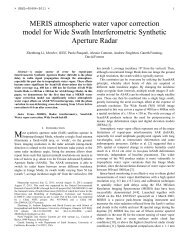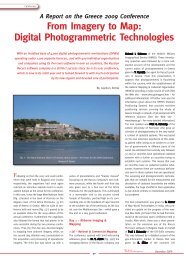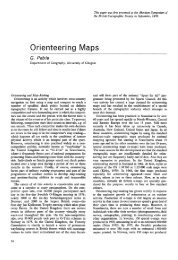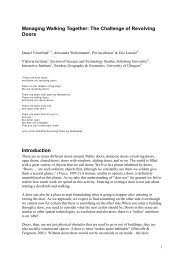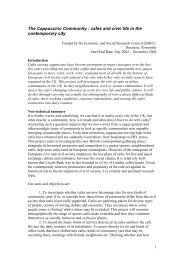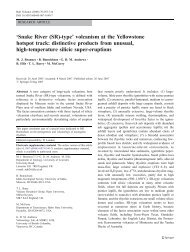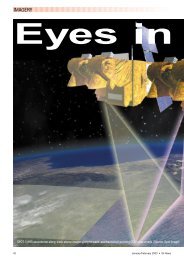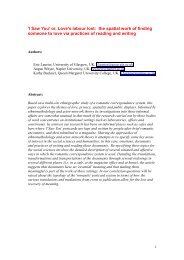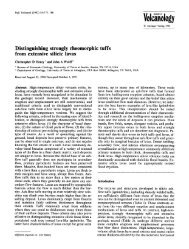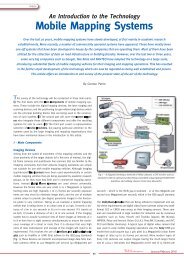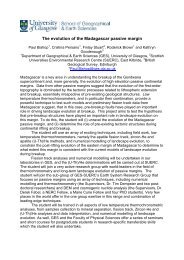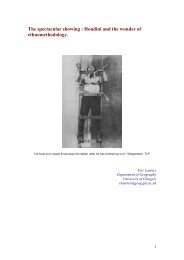Café Ethnography : the uses of tables and chairs
Café Ethnography : the uses of tables and chairs
Café Ethnography : the uses of tables and chairs
Create successful ePaper yourself
Turn your PDF publications into a flip-book with our unique Google optimized e-Paper software.
<strong>Café</strong> <strong>Ethnography</strong>:<br />
Returning to <strong>the</strong> ‘ignorants’ (as we will call those who break <strong>the</strong> rule without <strong>the</strong><br />
matter being raised by o<strong>the</strong>r customers or <strong>the</strong> staff) who place a coat, hat, bag or o<strong>the</strong>r<br />
personal item on <strong>the</strong> table; why is that <strong>the</strong>ir placing <strong>of</strong> a 'deposit' to hold <strong>the</strong>ir seat<br />
succeeds even though it is breaking <strong>the</strong> rule? 11 Perhaps because objects that can be<br />
seen by everyone to be someone else's possessions can only be interfered with at<br />
some degree <strong>of</strong> risk by a stranger, even when <strong>the</strong> possessions are being used to break<br />
a rule 12 . To move someone else's coat or a bag <strong>of</strong>f a chair breaks a more fundamental<br />
rule <strong>of</strong> public places while following ano<strong>the</strong>r which means that <strong>the</strong> 'mover' is liable to<br />
be challenged with: 'do you mind!' or 'hey get your h<strong>and</strong>s <strong>of</strong>f my jacket!' 'stop thief!'<br />
or a similar accusation. Being able to deploy <strong>the</strong> personal-items-on-seat tactic is<br />
never<strong>the</strong>less dependent on <strong>the</strong> socio-materially ordered manner in which members<br />
enter a place. If we consider for a moment one <strong>of</strong> <strong>the</strong> exclusive formal restaurants<br />
mentioned at <strong>the</strong> outset <strong>of</strong> this section; reserving a seat with a coat or bag just cannot<br />
be done since customers on entering <strong>the</strong> restaurant are shown to <strong>the</strong>ir table (which<br />
<strong>the</strong>reby generally becomes <strong>the</strong>irs for <strong>the</strong> duration <strong>of</strong> <strong>the</strong>ir meal) or to some o<strong>the</strong>r<br />
distinct holding area such as <strong>the</strong> bar or cocktail lounge by <strong>the</strong> waiting staff. Moreover<br />
allocation <strong>of</strong> customers to <strong>tables</strong> is almost entirely done in advance by telephone<br />
bookings etc. The Flaming Cup's rule <strong>of</strong> non-reservation can be gotten around by a<br />
more subtle tactic if <strong>the</strong>re are a group <strong>of</strong> customers dining toge<strong>the</strong>r. Just as a person<br />
might divide <strong>of</strong>f <strong>the</strong>ir belongings to stake a seating claim so a pack <strong>of</strong> people can split<br />
into table reservers <strong>and</strong> queuers <strong>and</strong> thus 'bend' <strong>the</strong> rule by presenting a situation<br />
whereby <strong>the</strong>y can be seen to be complying with it in part since some <strong>of</strong> <strong>the</strong> group are<br />
immediately queuing <strong>and</strong> at <strong>the</strong> same time disobeying it since <strong>the</strong> o<strong>the</strong>r part <strong>of</strong> group<br />
are reserving seats. So we can see that an element <strong>of</strong> informality is written not just on<br />
to <strong>the</strong> pink card on <strong>the</strong> door but also into <strong>the</strong> flexibility inherent in <strong>the</strong> ways in which<br />
seating can be taken by newly arrived customers <strong>and</strong> its reliance on a degree <strong>of</strong><br />
carefully established compromise amongst 'locals', 'ignorants' <strong>and</strong> <strong>the</strong> 'polite'<br />
customers. However this would only be if we treated rules as self-sufficient items<br />
elsewhere, whereas such rules even in very formal settings are followed <strong>and</strong> shown to<br />
be followed in multiple ways (Sharrock & Button 1999). 13<br />
The spatial production <strong>of</strong> social order becomes still more conspicuous if we now<br />
move onto ano<strong>the</strong>r common practice at <strong>the</strong> Flaming Cup: table-sharing. The sign on<br />
<strong>the</strong> door has a part to play in establishing <strong>the</strong> acceptability <strong>of</strong> table sharing. Having<br />
read <strong>the</strong> sign, observed how busy <strong>the</strong> café is <strong>and</strong> queued for <strong>the</strong>ir food customer(s)<br />
have time to realise that table-sharing is a common practice in <strong>the</strong> café. More<br />
specifically, on entering <strong>the</strong> café during a busy period a customer is able to witness<br />
people sharing <strong>tables</strong>, since <strong>the</strong> people at <strong>the</strong> <strong>tables</strong> have typically arranged<br />
<strong>the</strong>mselves at one <strong>of</strong> <strong>the</strong> round <strong>tables</strong> so as to politely disattend one ano<strong>the</strong>r (see fig.<br />
11<br />
Ged Murtagh reminded us that this kind <strong>of</strong> rule breaking appears harder to contest in <strong>the</strong> UK than in<br />
<strong>the</strong> case that he cites which occurred in A<strong>the</strong>ns. There, it is much more common that customers will<br />
speak up about someone reserving a café or bar seat without entitlement, <strong>and</strong> equally that for an<br />
'ignorant' so challenged, <strong>the</strong>y will quietly accept <strong>the</strong>ir ignorance as such <strong>and</strong> not as an insult or injury<br />
(which we would suggest is how such remarks are likely to taken by <strong>the</strong> locals in <strong>the</strong> UK).<br />
12<br />
An extreme example being <strong>the</strong> use <strong>of</strong> a car to hold on to a parking space in a city street. Such an<br />
object is both materially <strong>and</strong> more importantly legally hard to move without <strong>the</strong> owner's assistance <strong>and</strong><br />
it is only actors with special dispensations that are allowed to move cars, most significantly <strong>the</strong> Police<br />
(Sacks 1972).<br />
13<br />
Sharrock & Button in <strong>the</strong>ir work detail once again how Wittgenstein <strong>and</strong> Garfinkel’s version <strong>of</strong> rules<br />
remain frequently misunderstood.<br />
11



